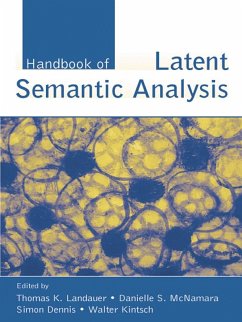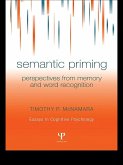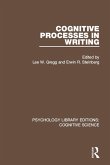Handbook of Latent Semantic Analysis (eBook, ePUB)
Redaktion: Landauer, Thomas K.; Kintsch, Walter; Dennis, Simon; McNamara, Danielle S.
57,95 €
57,95 €
inkl. MwSt.
Sofort per Download lieferbar

29 °P sammeln
57,95 €
Als Download kaufen

57,95 €
inkl. MwSt.
Sofort per Download lieferbar

29 °P sammeln
Jetzt verschenken
Alle Infos zum eBook verschenken
57,95 €
inkl. MwSt.
Sofort per Download lieferbar
Alle Infos zum eBook verschenken

29 °P sammeln
Handbook of Latent Semantic Analysis (eBook, ePUB)
Redaktion: Landauer, Thomas K.; Kintsch, Walter; Dennis, Simon; McNamara, Danielle S.
- Format: ePub
- Merkliste
- Auf die Merkliste
- Bewerten Bewerten
- Teilen
- Produkt teilen
- Produkterinnerung
- Produkterinnerung

Bitte loggen Sie sich zunächst in Ihr Kundenkonto ein oder registrieren Sie sich bei
bücher.de, um das eBook-Abo tolino select nutzen zu können.
Hier können Sie sich einloggen
Hier können Sie sich einloggen
Sie sind bereits eingeloggt. Klicken Sie auf 2. tolino select Abo, um fortzufahren.

Bitte loggen Sie sich zunächst in Ihr Kundenkonto ein oder registrieren Sie sich bei bücher.de, um das eBook-Abo tolino select nutzen zu können.
This handbook is the authoritative reference for the theory behind Latent Semantic Analysis (LSA), a burgeoning mathematical method used to analyze how words make meaning. The first book of its kind to deliver such a comprehensive analysis, it explores e
- Geräte: eReader
- mit Kopierschutz
- eBook Hilfe
- Größe: 9.69MB
Andere Kunden interessierten sich auch für
![Semantic Priming (eBook, ePUB) Semantic Priming (eBook, ePUB)]() Timothy P. McNamaraSemantic Priming (eBook, ePUB)57,95 €
Timothy P. McNamaraSemantic Priming (eBook, ePUB)57,95 €![Memory in the Real World (eBook, ePUB) Memory in the Real World (eBook, ePUB)]() Memory in the Real World (eBook, ePUB)53,95 €
Memory in the Real World (eBook, ePUB)53,95 €![Memory (eBook, ePUB) Memory (eBook, ePUB)]() Alan BaddeleyMemory (eBook, ePUB)52,95 €
Alan BaddeleyMemory (eBook, ePUB)52,95 €![Human Cognitive Neuropsychology (eBook, ePUB) Human Cognitive Neuropsychology (eBook, ePUB)]() Andrew W. EllisHuman Cognitive Neuropsychology (eBook, ePUB)42,95 €
Andrew W. EllisHuman Cognitive Neuropsychology (eBook, ePUB)42,95 €![Cognitive Processes in Writing (eBook, ePUB) Cognitive Processes in Writing (eBook, ePUB)]() Cognitive Processes in Writing (eBook, ePUB)40,95 €
Cognitive Processes in Writing (eBook, ePUB)40,95 €![The Athletic Brain (eBook, ePUB) The Athletic Brain (eBook, ePUB)]() Kenneth M. HeilmanThe Athletic Brain (eBook, ePUB)21,95 €
Kenneth M. HeilmanThe Athletic Brain (eBook, ePUB)21,95 €![The Elderly Eyewitness in Court (eBook, ePUB) The Elderly Eyewitness in Court (eBook, ePUB)]() The Elderly Eyewitness in Court (eBook, ePUB)66,95 €
The Elderly Eyewitness in Court (eBook, ePUB)66,95 €-
-
-
This handbook is the authoritative reference for the theory behind Latent Semantic Analysis (LSA), a burgeoning mathematical method used to analyze how words make meaning. The first book of its kind to deliver such a comprehensive analysis, it explores e
Dieser Download kann aus rechtlichen Gründen nur mit Rechnungsadresse in A, B, BG, CY, CZ, D, DK, EW, E, FIN, F, GR, HR, H, IRL, I, LT, L, LR, M, NL, PL, P, R, S, SLO, SK ausgeliefert werden.
Produktdetails
- Produktdetails
- Verlag: Taylor & Francis eBooks
- Seitenzahl: 544
- Erscheinungstermin: 15. Februar 2007
- Englisch
- ISBN-13: 9781135603274
- Artikelnr.: 39265670
- Verlag: Taylor & Francis eBooks
- Seitenzahl: 544
- Erscheinungstermin: 15. Februar 2007
- Englisch
- ISBN-13: 9781135603274
- Artikelnr.: 39265670
- Herstellerkennzeichnung Die Herstellerinformationen sind derzeit nicht verfügbar.
Thomas K. Landauer, Danielle S. McNamara, Simon Dennis, Walter Kintsch
Contents: Part I: Introduction to LSA: Theory and Methods. T.K. Landauer
LSA as a Theory of Meaning. D. Martin
M. Berry
Mathematical Foundations Behind Latent Semantic Analysis. S. Dennis
How to Use the LSA Website. J. Quesada
Creating Your Own LSA Spaces. Part II: LSA in Cognitive Theory. W. Kintsch
Meaning in Context. M. Louwerse
Symbolic or Embodied Representations: A Case for Symbol Interdependency. M.W. Howard
K. Addis
B. Jing
M.K. Kahana
Semantic Structure and Episodic Memory. G. Denhire
B. Lemaire
C. Bellissens
S. Jhean-Larose
A Semantic Space for Modeling Children's Semantic Memory. P. Foltz
Discourse Coherence and LSA. J. Quesada
Spaces for Problem Solving. Part III: LSA in Educational Applications. K. Millis
J. Magliano
K. Wiemer-Hastings
S. Todaro
D.S. McNamara
Assessing and Improving Comprehension With Latent Semantic Analysis. D.S. McNamara
C. Boonthum
I. Levinstein
K. Millis
Evaluating Self-Explanations in iSTART: Comparing Word-Based and LSA Algorithms. A. Graesser
P. Penumatsa
M. Ventura
Z. Cai
X. Hu
Using LSA in AutoTutor: Learning Through Mixed-Initiative Dialog in Natural Language. E. Kintsch
D. Caccamise
M. Franzke
N. Johnson
S. Dooley
Summary Streetr: Computer-Guided Summary Writing. L. Streeter
K. Lochbaum
N. LaVoie
J.E. Psotka
Automated Tools for Collaborative Learning Environments. Part IV: Information Retrieval and HCI Applications of LSA. S.T. Dumais
LSA and Information Retrieval: Getting Back to Basics. P.K. Foltz
T.K. Landauer
Helping People Find and Learn From Documents: Exploiting Synergies Between Human and Computer Retrieval With SuperManual. M.H. Blackmon
M. Kitajima
D.R. Mandalia
P.G. Polson
Automating Usability Evaluation Cognitive Walkthrough for the Web Puts LSA to Work on Real-World HCI Design Problems. Part V: Extensions to LSA. D.S. McNamara
Z. Cai
M.M. Louwerse
Optimizing LSA Measures of Cohesion. X. Hu
Z. Cai
P. Wiemer-Hastings
A.C. Graesser
D.S. McNamara
Strength
Weakness
and Extensions of LSA. M. Steyvers
T. Griffiths
Probabilistic Topic Models. S. Dennis
Introducing Word Order: Within the LSA Framework. Part VI: Conclusion. W. Kintsch
D.S. McNamara
S. Dennis
T.K. Landauer
LSA and Meaning: In Theory and Application.
LSA as a Theory of Meaning. D. Martin
M. Berry
Mathematical Foundations Behind Latent Semantic Analysis. S. Dennis
How to Use the LSA Website. J. Quesada
Creating Your Own LSA Spaces. Part II: LSA in Cognitive Theory. W. Kintsch
Meaning in Context. M. Louwerse
Symbolic or Embodied Representations: A Case for Symbol Interdependency. M.W. Howard
K. Addis
B. Jing
M.K. Kahana
Semantic Structure and Episodic Memory. G. Denhire
B. Lemaire
C. Bellissens
S. Jhean-Larose
A Semantic Space for Modeling Children's Semantic Memory. P. Foltz
Discourse Coherence and LSA. J. Quesada
Spaces for Problem Solving. Part III: LSA in Educational Applications. K. Millis
J. Magliano
K. Wiemer-Hastings
S. Todaro
D.S. McNamara
Assessing and Improving Comprehension With Latent Semantic Analysis. D.S. McNamara
C. Boonthum
I. Levinstein
K. Millis
Evaluating Self-Explanations in iSTART: Comparing Word-Based and LSA Algorithms. A. Graesser
P. Penumatsa
M. Ventura
Z. Cai
X. Hu
Using LSA in AutoTutor: Learning Through Mixed-Initiative Dialog in Natural Language. E. Kintsch
D. Caccamise
M. Franzke
N. Johnson
S. Dooley
Summary Streetr: Computer-Guided Summary Writing. L. Streeter
K. Lochbaum
N. LaVoie
J.E. Psotka
Automated Tools for Collaborative Learning Environments. Part IV: Information Retrieval and HCI Applications of LSA. S.T. Dumais
LSA and Information Retrieval: Getting Back to Basics. P.K. Foltz
T.K. Landauer
Helping People Find and Learn From Documents: Exploiting Synergies Between Human and Computer Retrieval With SuperManual. M.H. Blackmon
M. Kitajima
D.R. Mandalia
P.G. Polson
Automating Usability Evaluation Cognitive Walkthrough for the Web Puts LSA to Work on Real-World HCI Design Problems. Part V: Extensions to LSA. D.S. McNamara
Z. Cai
M.M. Louwerse
Optimizing LSA Measures of Cohesion. X. Hu
Z. Cai
P. Wiemer-Hastings
A.C. Graesser
D.S. McNamara
Strength
Weakness
and Extensions of LSA. M. Steyvers
T. Griffiths
Probabilistic Topic Models. S. Dennis
Introducing Word Order: Within the LSA Framework. Part VI: Conclusion. W. Kintsch
D.S. McNamara
S. Dennis
T.K. Landauer
LSA and Meaning: In Theory and Application.
Contents: Part I: Introduction to LSA: Theory and Methods. T.K. Landauer
LSA as a Theory of Meaning. D. Martin
M. Berry
Mathematical Foundations Behind Latent Semantic Analysis. S. Dennis
How to Use the LSA Website. J. Quesada
Creating Your Own LSA Spaces. Part II: LSA in Cognitive Theory. W. Kintsch
Meaning in Context. M. Louwerse
Symbolic or Embodied Representations: A Case for Symbol Interdependency. M.W. Howard
K. Addis
B. Jing
M.K. Kahana
Semantic Structure and Episodic Memory. G. Denhire
B. Lemaire
C. Bellissens
S. Jhean-Larose
A Semantic Space for Modeling Children's Semantic Memory. P. Foltz
Discourse Coherence and LSA. J. Quesada
Spaces for Problem Solving. Part III: LSA in Educational Applications. K. Millis
J. Magliano
K. Wiemer-Hastings
S. Todaro
D.S. McNamara
Assessing and Improving Comprehension With Latent Semantic Analysis. D.S. McNamara
C. Boonthum
I. Levinstein
K. Millis
Evaluating Self-Explanations in iSTART: Comparing Word-Based and LSA Algorithms. A. Graesser
P. Penumatsa
M. Ventura
Z. Cai
X. Hu
Using LSA in AutoTutor: Learning Through Mixed-Initiative Dialog in Natural Language. E. Kintsch
D. Caccamise
M. Franzke
N. Johnson
S. Dooley
Summary Streetr: Computer-Guided Summary Writing. L. Streeter
K. Lochbaum
N. LaVoie
J.E. Psotka
Automated Tools for Collaborative Learning Environments. Part IV: Information Retrieval and HCI Applications of LSA. S.T. Dumais
LSA and Information Retrieval: Getting Back to Basics. P.K. Foltz
T.K. Landauer
Helping People Find and Learn From Documents: Exploiting Synergies Between Human and Computer Retrieval With SuperManual. M.H. Blackmon
M. Kitajima
D.R. Mandalia
P.G. Polson
Automating Usability Evaluation Cognitive Walkthrough for the Web Puts LSA to Work on Real-World HCI Design Problems. Part V: Extensions to LSA. D.S. McNamara
Z. Cai
M.M. Louwerse
Optimizing LSA Measures of Cohesion. X. Hu
Z. Cai
P. Wiemer-Hastings
A.C. Graesser
D.S. McNamara
Strength
Weakness
and Extensions of LSA. M. Steyvers
T. Griffiths
Probabilistic Topic Models. S. Dennis
Introducing Word Order: Within the LSA Framework. Part VI: Conclusion. W. Kintsch
D.S. McNamara
S. Dennis
T.K. Landauer
LSA and Meaning: In Theory and Application.
LSA as a Theory of Meaning. D. Martin
M. Berry
Mathematical Foundations Behind Latent Semantic Analysis. S. Dennis
How to Use the LSA Website. J. Quesada
Creating Your Own LSA Spaces. Part II: LSA in Cognitive Theory. W. Kintsch
Meaning in Context. M. Louwerse
Symbolic or Embodied Representations: A Case for Symbol Interdependency. M.W. Howard
K. Addis
B. Jing
M.K. Kahana
Semantic Structure and Episodic Memory. G. Denhire
B. Lemaire
C. Bellissens
S. Jhean-Larose
A Semantic Space for Modeling Children's Semantic Memory. P. Foltz
Discourse Coherence and LSA. J. Quesada
Spaces for Problem Solving. Part III: LSA in Educational Applications. K. Millis
J. Magliano
K. Wiemer-Hastings
S. Todaro
D.S. McNamara
Assessing and Improving Comprehension With Latent Semantic Analysis. D.S. McNamara
C. Boonthum
I. Levinstein
K. Millis
Evaluating Self-Explanations in iSTART: Comparing Word-Based and LSA Algorithms. A. Graesser
P. Penumatsa
M. Ventura
Z. Cai
X. Hu
Using LSA in AutoTutor: Learning Through Mixed-Initiative Dialog in Natural Language. E. Kintsch
D. Caccamise
M. Franzke
N. Johnson
S. Dooley
Summary Streetr: Computer-Guided Summary Writing. L. Streeter
K. Lochbaum
N. LaVoie
J.E. Psotka
Automated Tools for Collaborative Learning Environments. Part IV: Information Retrieval and HCI Applications of LSA. S.T. Dumais
LSA and Information Retrieval: Getting Back to Basics. P.K. Foltz
T.K. Landauer
Helping People Find and Learn From Documents: Exploiting Synergies Between Human and Computer Retrieval With SuperManual. M.H. Blackmon
M. Kitajima
D.R. Mandalia
P.G. Polson
Automating Usability Evaluation Cognitive Walkthrough for the Web Puts LSA to Work on Real-World HCI Design Problems. Part V: Extensions to LSA. D.S. McNamara
Z. Cai
M.M. Louwerse
Optimizing LSA Measures of Cohesion. X. Hu
Z. Cai
P. Wiemer-Hastings
A.C. Graesser
D.S. McNamara
Strength
Weakness
and Extensions of LSA. M. Steyvers
T. Griffiths
Probabilistic Topic Models. S. Dennis
Introducing Word Order: Within the LSA Framework. Part VI: Conclusion. W. Kintsch
D.S. McNamara
S. Dennis
T.K. Landauer
LSA and Meaning: In Theory and Application.







